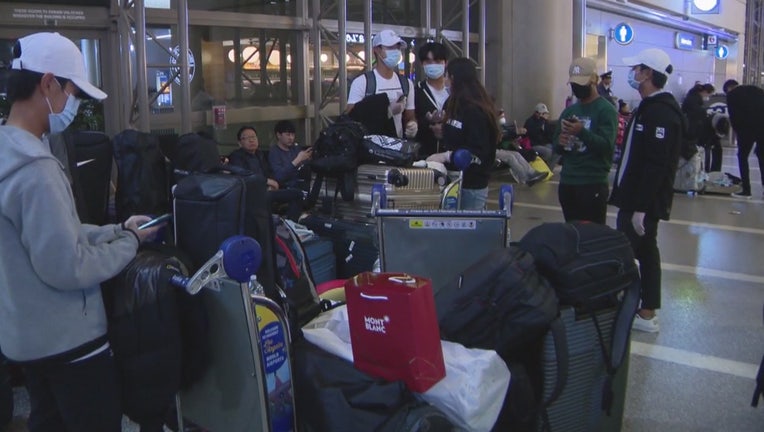L.A. County declares state of emergency amid 7 confirmed cases of COVID-19 coronavirus

LOS ANGELES - Officials with the Los Angeles County Board of Supervisors and the Los Angeles County Department of Health declared a local public health emergency Wednesday morning.
The proclamation comes the day after the second case of the novel coronavirus in L.A. County was confirmed by health officials. The patient was treated at a Kaiser Permanente hospital and is currently in self-isolation.
RELATED: Medical professional screening passengers at LAX airport tests positive for coronavirus
Now, there are seven confirmed cases of the COVID-19 coronavirus in the county.
Three of the infected patients recently traveled to Northern Italy, two patients had family members who live outside the area that had the virus, and the sixth patient has a job that requires them to make contact with travelers.
"We must remain vigilant," said L.A. County Board of Supervisors Chairwoman Kathryn Barger.
Los Angeles County officials declare a local and health state of emergency amid coronavirus outbreak
Officials with the Los Angeles County Board of Supervisors and the Los Angeles County Department of Health declared a local and public state of emergency. As of Wednesday morning, there were seven confirmed cases in the county.
WATCH: L.A. County officials make major announcements related to the novel coronavirus
"Our main message is that the City of Los Angeles and cities of the county have done everything possible to be ready and this is everyone's responsibility," said Los Angeles Mayor Eric Garcetti.
Barger also said the proclamation comes as “an abundance of caution," and that the state and the federal government will continue to work together. In addition, she stated the local government, health care facilities, schools, and communities must be active in efforts to be prepared for more cases and should be doing everything possible to slow down the spread of the virus.
“We will continue to mobilize county resources, accelerate emergency planning, streamline staffing, coordinate with agencies across the county and state and federal partners, and raise awareness about how everyone can be prepared for more cases and community spread,” said Barbara Ferrer, Ph.D., the Director of the L.A. County Department of Public Health.
County officials anticipate more cases of the coronavirus across Southern California as the virus continues to spread worldwide.
RELATED: Second case of coronavirus in Los Angeles County confirmed
“As more cases are identified and community spread is detected in numerous areas, the possibility of sustained community spread of this virus in the US will increase,” said Muntu Davis, MD, a Health Officer for Public Health. “Everyone and every organization has to do their part to help slow the spread of this virus.”
"If you’re sick with anything, we need people to stay home," Ferrer said.
Dr. Ferrer said people can help slow the virus from spreading by doing the following:
• Stay at home if you’re sick to prevent coming into contact with someone who’s well to prevent the spread of illnesses.
• Wash hands with soap and water for 20 seconds frequently.
• Cover your mouth when you cough or sneeze.
• Throw tissues into the trash once they’re used.
• Get immunized for the flu if you haven’t already.
• Don’t hug or use handshakes when meeting someone new. Instead, acknowledge them verbally.
• Aim to keep 6 feet between yourself and people you don’t know at large events.
• Make sure your bathrooms are fully stocked and can support handwashing.
• Disinfect frequently used surfaces at home and in the workplace such as door handles and elevator buttons.
The Centers for Disease Control and Prevention does not recommend people who are well to wear facemasks.
RELATED: The latest news stories on the coronavirus
On Monday, two new possible cases of the coronavirus were confirmed in Orange County and four firefighters with the Orange County Fire Authority were quarantined after caring for a patient who displayed coronavirus symptoms.
RELATED: 2 'presumptive' new cases of coronavirus reported in Orange County
The cities of Pasadena and Long Beach were also expected to declare a public health emergency out of precaution over coronavirus.
RELATED: Pasadena, Long Beach to declare public health emergencies over coronavirus
Get breaking news alerts in the FOX 11 News app. Download for iOS or Android.
Click here for more information from LA public health.

